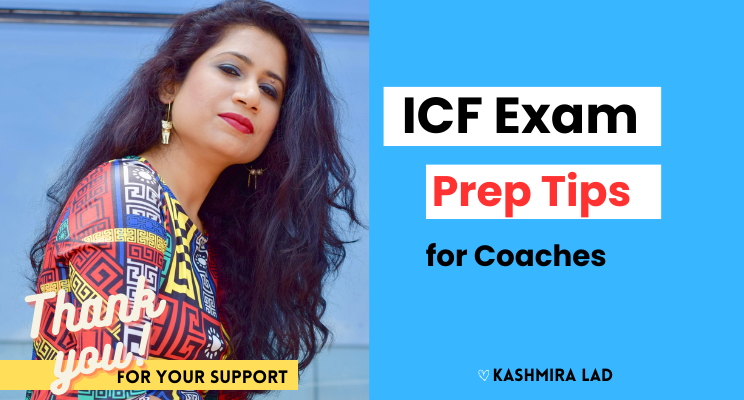Embarking on the journey to achieve the International Coaching Federation (ICF) Professional Certified Coach (PCC) credential has been a transformative and deeply rewarding experience for me. I am delighted to share that with the support of numerous individuals and my dedication, I have successfully attained this prestigious coaching credential. This achievement holds special significance in my professional life, marking a significant milestone in my coaching as well as marketing career.
As a token of gratitude to those who have played a pivotal role in my success, I am thrilled to kick off this blog dedicated to ICF exam preparation tips. In the following content, I aim to provide valuable insights and strategies that have proven effective in my own journey, with the hope of assisting aspiring coaches in their pursuit of excellence. Join me in this exploration of the ICF certification process, as we delve into practical advice and lessons learned that can guide you towards success in the ICF ACC/PCC/MCC examination.
What you could do for the ICF Exam Prep:
- Understand all ICF Core Competencies + Code of Ethics. – read them as many times as you can – all details are available on the ICF website. Live and breathe coaching – that’s what you’ll need!
- Trust your instinct while answering the exam based on your prep above – use the basic framework of the CCs and Ethics to make the decision.
- ACCAT method by Lyssa deHart is helpful to recollect when time is less and panic might set in while answering the exam. Write the ACCAT points on the whiteboard (if answering online) or on the paper given to you (offline exam center).
A refers to Asking V/s Telling,
C refers to Curiosity V/s not being CuriousC refers to Client Centered V/s not being client centered (Understand the answer options and ask, “Is the answer option coach centered?”)A refers to Awareness of our judgments and bias v/s being unaware of themT refers to Transparency v/s not being transparent.All the above support to view the answers and reason them out quickly. - The Awaken Coach Institute has a video series with the reasoning behind the ICF Mock Exam answers in their YouTube videos – use this as a base to understand any question that you read.
- Always keep it client-centric. This will support to evaluate the answers.
- Please do not rely entirely on the free tests available online. IMHO -they are not completely aligned to the actual test. I prefer to frame my scenarios. (I have worked extensively with coaches earlier for their marketing requirements to develop ICF-accredited program content hence my opinion is based on sound practice in knowing what to expect in the exam…to a certain extent).
7. Focus on your speed. Practice with mock exam questions to understand the time required.
8. Think from the ICF perspective – what is it that is required from you as a Coach by adhering to the ICF Code of Ethics and standards? Keep this in mind always.
9. Trust yourself– somebody else’s negative experience about the exam need not be yours to embrace. You CAN do this!
10. Read+Read+Read. Improve your reading speed. This plays an important role.
11. A lot of free resources online mention focusing on the verbs. However, some wrong answers are written in a tricky way so focusing only on the verbs may not help. Focus on the context.
12. Most importantly- the practice of yoga and meditation supports staying calm. Yes, it’s a tight timeline, but a calm approachwill ensure you have plenty of time to review your answers. It’s tough but not as much as your mind can trick you into believing something negative about yourself or the process!
During the Exam:
Pearson VUE emails and rules may seem intimidating to many but here is my experience-
- The online exam experience was smooth – READ+FOLLOW all their rules. Read the emails in detail and note down the important points.
- Keep your backup ready in terms of electricity and internet if you choose to answer at home. Ensure this is stable and you have no worries. In India, this was a major concern and worry for me as we had an outage due to a cyclone. (Weather challenges, lack of backups, loud disturbances from neighbors can be deterrents but don’t obsess over it.)
- Ensure your gadgets are updated as per their (Pearson VUE) requirement. You will need to use your phone to upload your photos (selfie+surrounding) so keep the phone in the room. Once used, keep it out of reach (but in the same room).
- Follow all the rules- clear the table and surroundings. I moved my cupboard to the other room as it has plenty of books and it was right next to the work desk.
- The process is simple in terms of clicking your photos+uploading selfies, etc. So, do not panic if you read negative experiences on the same. It need not be the same for you – research appropriate videos.
- Remove the mental blockof your proctor peering at you online using the webcam – once you begin the test, it does not matter.
- The Pearson Vue proctor was super helpful – they are here to help and do their job. Remember that! He asked me to show him the room and go closer to the desk (there was a mouse pad) and he wanted to see that. Fair enough! (You are allowed a bottle of water.)
- Keep your IDs nearby (behind) and accessible if needed.
- Once you begin the exam –Breathe deeply to calm your nerves. Answer all questions initially and return to review in whatever time is left. This helps in understanding where you need to change the options for the Best or Worst case scenarios.
- Find the Best answer first, then use the CC and Ethics to understand the next best and the extremely Worst answer. This will help to narrow things down.
- Flag the questions you doubt – answer them anyway and return to them later.
- Click on the End Exam button only when you have finished the second half of the exam. Read the instructions carefully before the exam and before the break.
- A 5-minute break is allowed. In case you are late, that time will be deducted from the exam time. There is no need to panic.
14. I needed a clock so I hung it right above me on the wall (avoid on the desk). A timer appears on the laptop screen that shows the time left but I feel comfortable looking at the clock. Do what is best for you. (You cannot use a watch.)
Enjoy the process of being a Coach, take it as a challenge, maintain presence, and the rest will be easy!
Follow me on LinkedIn for more updates on Coaching.



